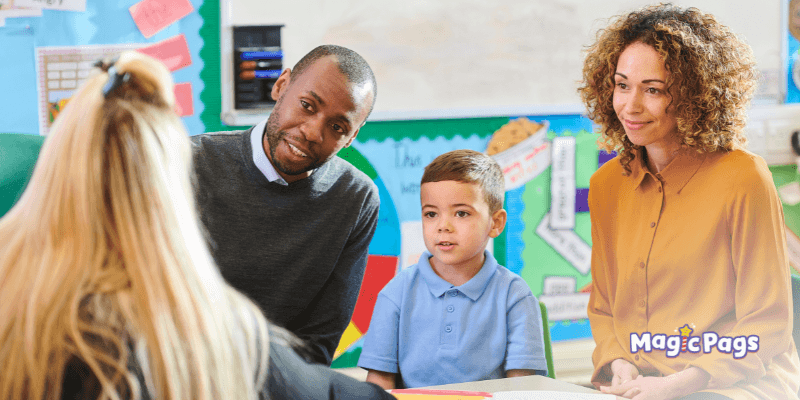20 Essential Questions Parents Should Ask Teachers About SEL

Social emotional learning (SEL) is an important part of a child’s development. It helps children understand and manage emotions, build relationships, and make good decisions. From a young age, children start to feel different emotions, interact with others, and become aware of themselves. These early experiences shape how they handle social situations and emotional challenges in the future.
In today’s world,Schools today know how important SEL is. They include it in lessons to help students do well in both school and life. When children learn to express feelings, listen to others, and solve problems calmly, they handle social situations better. Studies show that SEL improves behavior, school performance, and overall well-being. You can visit our blog page to explore the core principles of SEL and its importance in early childhood.
Parents have an important role in supporting SEL at home. Staying informed about their child’s progress and working with teachers can help. Asking the right questions helps parents understand their child’s emotional and social development. This way, they can provide the right support at home.
How Schools Use SEL to Support Students
Many schools now include SEL in daily lessons. Programs like Wisdom: The World of Emotions help students learn important social emotional skills. These skills help children grow both in school and in life.
Parents may wonder how SEL helps their child. One way is by improving academic performance. SEL teaches children to manage emotions, focus on tasks, and work well with others. It also helps behavior. Children learn to handle conflicts, be more understanding, and control their reactions.
Schools teach SEL in different ways. Parents may want to know how much time schools spend on these lessons. Understanding this can help parents support learning at home. Some parents also want ideas on how to practice SEL outside school. Simple activities like talking about emotions, reading stories, or solving problems together can help children develop these skills.
Parents may also want to ask what specific skills their child is learning. These may include self-awareness, controlling emotions, building relationships, and making responsible choices. Since every child is different, parents can also ask how SEL programs adapt to meet each student’s needs.
Why SEL Matters
Research shows that SEL is very important for children. It helps them understand their emotions, make good choices, and build friendships. According to the Center on the Developing Child at Harvard University, children with strong SEL skills do better in school and life. Learning how to handle emotions, work well with others, and solve problems makes children feel more confident and independent.
A study by the Collaborative for Academic, Social, and Emotional Learning (CASEL) found that students with SEL training perform better in school. They focus more, complete their work, and take part in class activities. These students also behave better. They have fewer conflicts and are more disciplined (CASEL, 2017). SEL skills not only help in school but also shape good habits for life, like self-control, empathy, and problem-solving.
How Parents Can Support SEL at Home
Parents can help by encouraging children to talk about their feelings. When children share their emotions, they learn to understand and control them better. Parents can also be good role models by showing kindness, listening carefully, and solving problems calmly.
Setting clear rules at home and school helps too. When children know what is expected of them, they learn to be responsible and self-disciplined. Parents can also help children control emotions by discussing different situations. Talking about problems and thinking of solutions together builds confidence and emotional strength.
Working with teachers makes SEL more effective. Parents who stay involved in their child’s SEL journey can make a big difference. Asking the right questions helps them understand their child’s growth and needs.
20 Essential Questions to Ask About Your Child’s Social-Emotional Growth
When meeting with your child’s teacher, consider asking these key questions:
General SEL Development
- Have you noticed any sudden changes in my child’s behavior?
- Does my child express emotions clearly and appropriately?
- How does my child handle new or unfamiliar situations?
Classroom Behavior & Interactions
- Does my child prefer playing alone or engaging with classmates?
- Does my child listen and respond respectfully to teachers and peers?
- How does my child handle classroom rules and instructions?
Emotional Regulation & Problem-Solving
- Does my child get easily frustrated with schoolwork?
- How does my child react to conflicts with other students?
- Does my child demonstrate self-control when facing challenges?
Empathy & Social Skills
- Does my child show kindness toward peers?
- How does my child respond when a friend is upset?
- Does my child respect and appreciate differences in classmates?
Confidence & Independence
- Does my child participate in group activities?
- Does my child display confidence in their abilities?
- Does my child think before acting, or are they impulsive?
Focus & Engagement
- Is my child easily distracted in class?
- Does my child show signs of boredom or disinterest in lessons?
- Is my child well-liked by other students?
Teacher Recommendations
- How can I support my child’s social-emotional development at home?
- Are there specific SEL activities or strategies I should try?

A little buffalo feels sad when he is away from his mother. He misses her and wants to be close to her all the time. Over time, he learns something important. Love doesn’t go away, even when we are apart. Love stays in our hearts. This makes him feel safe and happy.
- Educational Values: Emotional strength, confidence, self-soothing, emotional growth
Category: Animals
Author: Thais Laham Morello

The Moon Seed by Katarína Macurová is a magical story about hope and friendship. This beautifully illustrated book shows how a tiny moon seed brings light and joy to a dark village. It encourages children to believe in change and kindness.
- Category: Space, Creativity, Friendship
- Educational Value: Teaches hope, creativity, and kindness.
- Age: 3-5
- Publisher: Albatros Media
- Reading Levels: GRL: J, DRA: 16, Lexile: 400L, AR: 2.5
Final Thoughts
Social-Emotional Learning (SEL) is an important part of a child’s development, helping them understand emotions, build friendships, and make smart choices. Schools focus on SEL, but parents play a big role too. Kids learn best when lessons continue at home.
At Magic Pags, we believe learning should be fun and engaging. Our digital library is designed to help children grow emotionally while improving their reading skills. Through interactive stories, kids explore emotions, problem-solving, and social skills in a playful way. Parents can track their child’s progress using our Parental Dashboard, which offers insights and personalized reading recommendations.
By joining the Magic Pags testing program, parents and teachers can access a free 3-month trial and track children’s progress.
Join testing today and help them build essential social and emotional skills!




